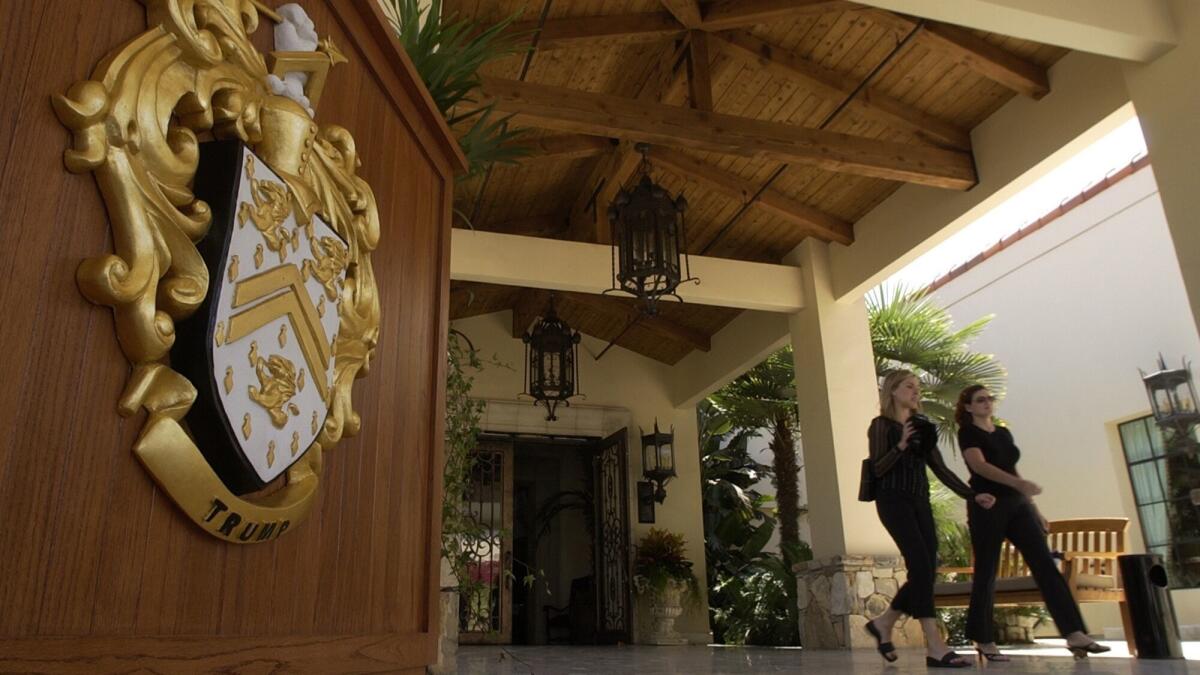Rancho Palos Verdes voters to decide on worker salaries and panic buttons — but not until 2019

The city of Rancho Palos Verdes confirmed that a petition drive has collected enough signatures to put a measure on the ballot to raise salaries and provide panic buttons for hospitality workers, but residents won’t vote on the initiative until 2019.
The five-member City Council voted unanimously to place the measure on the ballot for Nov. 5, 2019, raising protest from a union that collected more 4,000 signatures on behalf of workers in the city’s ritzy Terranea Resort and the Trump National Golf Club.
The union, Unite Here Local 11, has threatened to file a lawsuit to force the city to place the measure on a ballot sooner than 2019.
“We are appalled at the city’s behavior, that they would leave women vulnerable for another year,” union spokesman Andrew Cohen said. “We are considering all options to continue pushing for these protections, including litigation.”
The next statewide election is Nov. 6, but Rancho Palos Verdes City Clerk Emily Colborn said her city does not have an election scheduled for that date, and launching a special election on Nov. 6 would cost the city up to $200,000.
Instead, she said, state law allows the city to wait until the next regular citywide election — set for Nov. 5, 2019. The cost to put the measure on the ballot next year would only be $3,000 to $5,000, she said.
If approved by a majority of the voters, the initiative would require the Terranea Resort and the Trump National Golf Club to provide panic buttons for employees who work alone in isolated locations and may be vulnerable to threats and sexual assaults, the union said. The buttons can be used to automatically call for aid.
The measure also would guarantee workers a $15-an-hour minimum wage, with regular raises until 2022, among other benefits.
An economic analysis, commissioned by the city, said the initiative would cost Terranea up to $8 million a year by 2022. The analysis by the economic consulting firm Kosmont Co. said it was unable to collect financial information from Trump National Golf Club.
The analysis said a county-owned golf course, Los Verdes Golf Course, would also be obligated to provide panic buttons and offer pay hikes, at a cost of up to $500,000. Cohen said the union believes the initiative wouldn’t apply to the Los Verdes Golf Course.
The analysis concluded that the impact of the measure would be substantial, making it financially unfeasible to open a new hotel in the city. The initiative could also reduce hospitality taxes to the city if Terranea and Trump National Golf Club were forced to increase prices enough to dissuade people from going there, the analysis found.
“This Initiative if enacted in its entirety, would likely represent a significant financial burden on the city’s major taxpaying hospitality and golf operations/entities,” the report concluded.
The analysis also said that hotel workers at Terranea can already summon help through iPads used to keep track of their hours.
Cohen said Terranea and the Trump golf club can afford to pay workers enough to live on.
The ritzy resort on the shore of the Palos Verdes Peninsula was targeted by the union because Sandra Pezqueda, a former Terranea Resort worker, said she was fired in 2016 after complaining about sexual advances by her supervisor.
A representative of Terranea said a settlement was reached between Pezqueda and an outside temporary staffing agency whose two employees were involved in the claim of harassment at the resort. The resort said it no longer is involved in a lawsuit about harassment allegations.
To read more about the travel and tourism industries, follow @hugomartin on Twitter.
More to Read
Inside the business of entertainment
The Wide Shot brings you news, analysis and insights on everything from streaming wars to production — and what it all means for the future.
You may occasionally receive promotional content from the Los Angeles Times.











